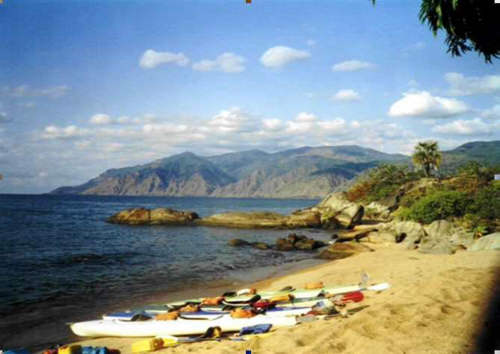Multi-Activity Expedition ‘Northern Azungu’ - Malawi, July / August 2003
City of Edinburgh University Officers’ Training Corps
Northern Azungu was a six week expedition to Malawi, aiming to develop the leadership skills of the Officer Cadets from the City of Edinburgh Universities Officer Training Corps. The expedition included elements of adventure training and participation in a rural community development project.

|
The first phase of the expedition was kayaking
from Nkhata Bay to Ruarwe on Lake Malawi. This was a 75km route over four days
up the western shore of Lake Malawi, with roughly four hours of each day being
spent kayaking. This allowed enough time to enjoy various activities en route,
including swimming and snorkelling and rock jumping. A 25 feet drop from a rock
outcrop was a height dismissed by many when seen from ground level, only to be
viewed with a new-found respect when looking from the top.
The reader would be forgiven for associating Malawi with golden sand beaches, still clear blue waters and unbroken blue skies. However, in reality Lake Malawi threw at us some impressive swells testing the more delicate paddlers. Ironically perhaps the most trying phase of the expedition for both groups proved to be the journey back to Nkhata Bay. This had us sitting in the open wooden safety boat, kayaks in tow, back to the lodge. The first group took eight hours to complete the journey, and the second, enduring rough waters, AWOL kayaks, and a stop to change engines, around eleven (a journey described as "Emotional" by many of the team). |
After the kayaking we moved to the community project in Mazonda. Within this small rural community, constant streams of volunteers appeared during our 3 week stay. The aim was to complete a 10m x 20m school. Through the commendable hard work and patience of the team and locals, the building was constructed up to window level. We departed having left all the necessary materials for the completion of the project, with promises from local people that it would be finished.
The group next moved to Blantyre to begin preparations for the week’s trekking in the Mulanje Mountains. The overall expedition leaders were 2Lt Streatfeild and WO2 Smith; however, responsibility for each phase of the trek was handed over to the officer cadets, who, in pairs, were responsible for the planning and execution.
The first leg took the group along an 8.4km path, which rose 960 metres amongst spectacular scenery into the Chambe Basin. A memorable lunch stop was made by a rock pool under a waterfall, a number of cadets braving what were uncomfortably chilly waters.


An early start on day two saw the team make the ascent of Chambe peak, an imposing climb to 2500 metres which was, at points, particularly tricky. The team remained in good spirits to complete a route which many found to have decidedly uncomfortable aspects!
The next leg of the journey saw the cadets rising before sunrise to embark on what was sure to be the hardest day yet. The route planned was to take the team 8.4km to Sapitwa peak, at 3001 metres the highest peak in Malawi. The high temperatures meant Sapitwa proved a little harder than was anticipated, and following a challenging ascent and descent, the team departed to the next mountain hut under darkness.
After fourteen hours of trekking on day three, the fourth day of the expedition was a scenic route through the Ruo Basin, a picturesque sweep of hills with bush fires raging on the mountain sides. The final day of the expedition dawned to horrendous weather conditions, with driving rain, high winds, and low visibility. The rain made for hazardous going but with a steady pace a safe descent was made in good time. This brought to a close the final phase of the trek. Invaluable lessons were learnt, from map-reading to general leadership skills, bringing to a perfect close an expedition thoroughly enjoyed by all.
OCdt David Simpson
